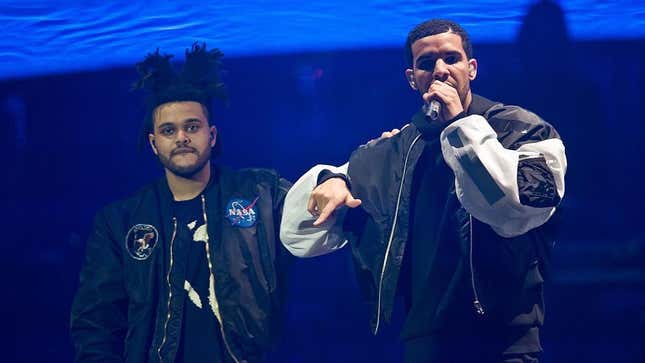
I’ve tried my best to keep myself away from all of the conversations surrounding AI-generated songs, but I just can’t ignore this latest controversy.
For the past month, it has been a trend on social media for people to use artificial intelligence (AI) to recreate the voices of some of the most popular artists in the world and make it sound like they’re singing the lyrics to a song they weren’t even a part of. Techies have created AI versions of Drake rapping Ice Spice’s “Munch”, Rihanna singing Beyonce’s “Cuff It” and Kanye West rapping Travis Scott’s “90210".
This trend was all cute and dandy until Universal Music Group (UMG) requested that Spotify, Apple Music, and other streaming services don’t allow AI to use music from their catalog, including AI-generated songs that take certain melodies and lyrics owned by UMG. Over the weekend, an original track, titled “heart on my sleeve,” started appearing all over social media and streaming services. The song, which was created by someone who goes by the name “ghostwriter,” features the voices of Drake and The Weeknd, but is recreated using AI.
While I thought this would be another stupid AI-generated track that would just come and go, the original track has become immensely popular on social media, garnering more than 630,000 listens on Spotify and 230,000 plays on YouTube before it was taken down.
This latest song has created a new issue for UMG and other major labels, what if people are using AI to create original music but are mimicking the voices of some of our most popular signees? This led UMG, where both Drake and The Weeknd are signed, to release a statement on the recent uptick in deep fakes:
“UMG’s success has been, in part, due to embracing new technology and putting it to work for our artists–as we have been doing with our own innovation around AI for some time already.”
With that said, however, the training of generative AI using our artists’ music (which represents both a breach of our agreements and a violation of copyright law) as well as the availability of infringing content created with generative AI on DSPs, begs the question as to which side of history all stakeholders in the music ecosystem want to be on: the side of artists, fans and human creative expression, or on the side of deep fakes, fraud and denying artists their due compensation.”
“These instances demonstrate why platforms have a fundamental legal and ethical responsibility to prevent the use of their services in ways that harm artists. We’re encouraged by the engagement of our platform partners on these issues–as they recognize they need to be part of the solution.”
Why is it a problem for labels and their artists?
The answer is simple. It’s stealing.
This “ghostwriter” is essentially taking the likeness of two artists and creating a song they had nothing to do with. It’s particularly an issue because it’s something that music fans are enjoying. Those streaming numbers speak for themselves and those 630,000 listens of “heart on my sleeve” on Spotify could’ve been aimed toward an actual song Drake or The Weeknd created.
This opens an even bigger issue because more times than not, these examples of AI-generated songs on the internet are creating Black music without using the Black people that created it. It’s the same reason Capitol Records dropped FN Meka, an AI-controlled rapper that only existed in the metaverse. He was a caricature of a modern-day artist who displays all of the gross stereotypes of rappers and people in the Black community.
Non-Black people who are sitting at home behind a computer can do the same thing by creating a song that sounds like it was created by their favorite rapper, but not deal with the consequences of stealing their likeness.

